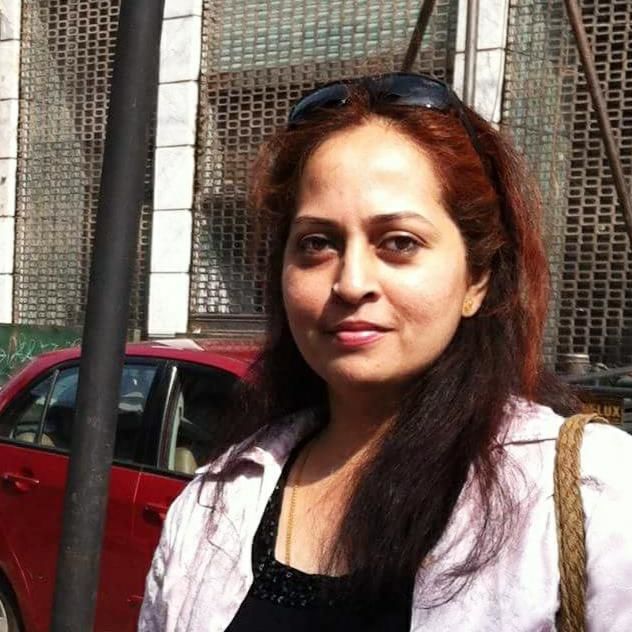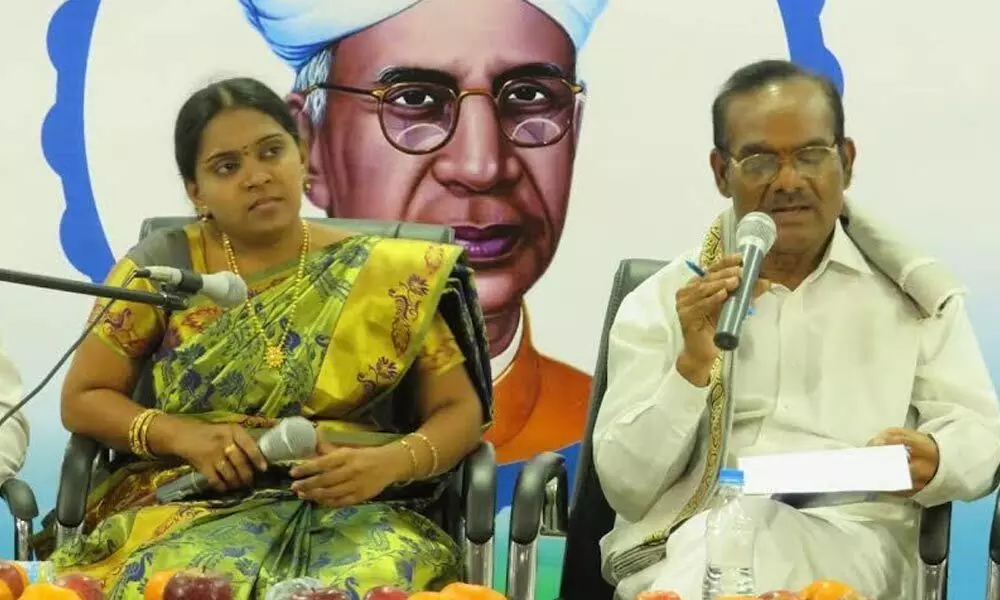Live
- Nizamabad MP Dharmapuri Arvind and Jagtial MLA Dr. Sanjay Kumar Meet CM Revanth Reddy
- Hyderabad CP CV Anand Issues Stern Warning to Bouncers
- MP Laxman Criticizes Police Conduct, Calls for Support for Victims' Families
- Fire Breaks Out in Kachiguda-Chennai Egmore Express, Passengers Evacuated Safely
- CM Revanth Reddy Condemns Attacks on Film Personalities' Homes, Calls for Strict Action
- Victory Venkatesh and Nandamuri Balakrishna to Set Screens on Fire with Unstoppable Season 4
- Over 71.81 crore Ayushman Bharat Health Account numbers generated: Centre
- In special gesture, Kuwait's Prime Minister sees-off PM Modi at airport after conclusion of historic visit
- Veer crowned PGTI Ranking champion, Shaurya wins emerging player honour
- Sr National Badminton: Unseeded Rounak Chauhan, Adarshini Shri reach singles semis
Just In
Breaking stereotypes, Bulusu Aparna carves a niche in Telugu literature


Breaking stereotypes, Bulusu Aparna carves a niche in Telugu literature
At a time when suicide rate keeps increasing, Aparna suggests, the younger generation should be introduced to Avadhanams so that they would become mentally tougher and be able to accept failure with a pinch of salt
In a field where the presence of women is comparatively less, Bulusu Aparna says that she's glad to break stereotypes, follow her heart and explore the line she has always been fond of.
After presenting more than 150 'Ashtaavadhanams' and five 'Satavadhanams' across Andhra Pradesh, Telangana, Tamil Nadu, Karnataka and Odisha, she now sets her eyes on 'Sahasraavadhanam'.
Currently working as Sanskrit teacher at Sri Venkateswara Devasthana Oriental High School in Dwaraka Tirumala, West Godavari, Aparna says when a person can do Satavadhanam, he or she can multitask, focusing on 100 different things at a time and also pay attention to each task individually as well. "Our brain is a sharper weapon than we could ever imagine. Avadhanams not only help in enhancing our concentration level but also prepare us to handle stress far better. Yes, women are less in this field for various reasons. Unfavourable situation, priorities and lack of family support often dissuade women from foraying into literary feats consistently," opines the 33-year-old Avadhani in an interview with The Hans India.
At a time when suicide rate keeps increasing, Aparna suggests, the younger generation should be introduced to Avadhanams so that they would become mentally tougher and be able to accept failure with a pinch of salt.
After completing her 10th Grade, Aparna opted for a pre-degree course (PDC) Oriental BA that focused on Telugu, Sanskrit, History and English. "The five-year-long course was earlier known as Bhasha Praveena. As I was passionate about Telugu and Sanskrit, I decided to tread a less-travelled road. Fortunately, my parents Naga Padma Meenakshi and Bulusu Atchuta Rama Mohan, who worked as Telugu teachers, supported my decision," she recalls.
Since her childhood, Aparna grew up admiring her father penning down poetry, especially 'vachana kavitvam' and 'geya kavitvam'. "Language's my calling. Since I was able to spot it early, I could align my passion with my academic and professional goals. I am grateful to my lecturers and readers at Andhra Yuvathi Samskruta Kalsala in Rajahmundry (now Rajamahendravaram) who provided me an ecosystem in gaining a grip over grammar, 'chandassu', 'alankaralu', traditional poetry and pick up the nuances of Telugu literature from the vast knowledge they possessed," says the Avadhani.
It was in one of those classrooms, the seed of becoming an Avadhani was sown. A couple of years down the line, Aparna presented her first Avadhanam at the age of 18. And it was just the beginning of the new chapter of her life. Among several others, Aparna was awarded with 'Avadhana Vidya Saraswathi' and 'Avadhana Vidhwan Mani' titles.
Talking about well-known poets, Aparna says, "Tirupati Venkata Kavulu, Kopparapu Kavulu, Madabhushi Venkatacharyulu occupy a prominent place in Telugu literature. With their brilliant talent, Avadhanams garnered a global recognition. Each had their own style and there is so much to learn from them. For instance, it was difficult to keep pace with Kopparapu poets as no one used to match up with their speed of presentation. They presented Avadhanams on any subject spontaneously and went to any length of poetry that stretched from four lines to forty and hundred lines or even beyond that. They were such experts."
Expressing concern over the declining trend of Telugu language in Andhra Pradesh, Aparna says, "In western countries, our language is given the prime importance. In countries like Japan, people are evincing interest not just to learn Telugu but perfect the language. Back home, we accord significance to English. It is unfortunate to see the shift which is totally uncalled for as learning in one's mother tongue is essential for a deeper understanding of concepts and strengthening the foundation."

© 2024 Hyderabad Media House Limited/The Hans India. All rights reserved. Powered by hocalwire.com






